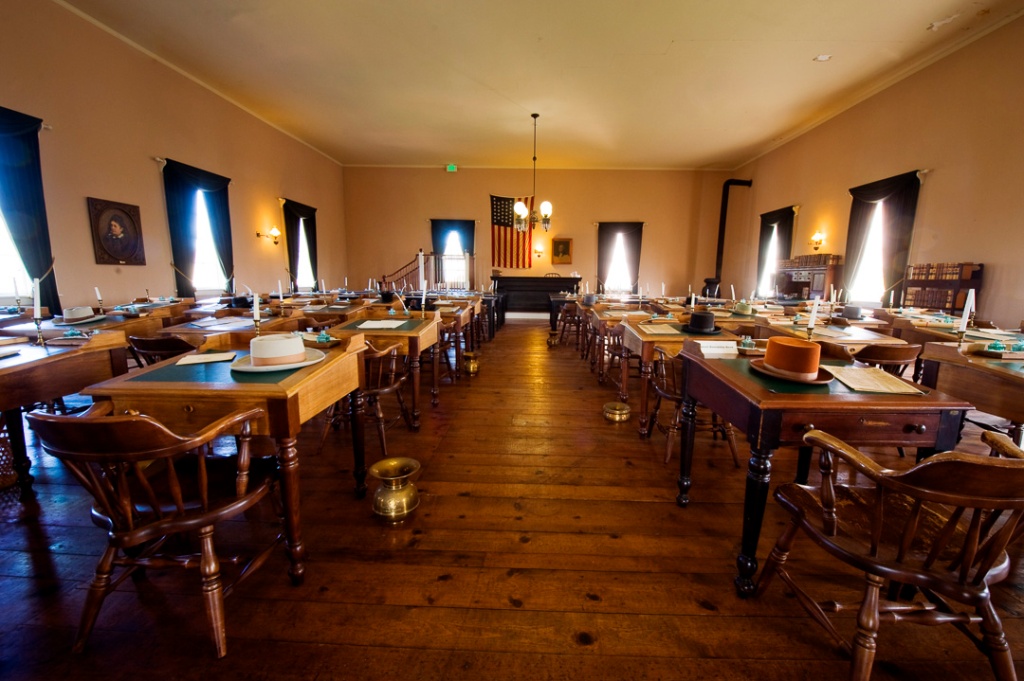October 17, 2021 - By California operates nearly 300 state parks and recreation areas that offer forests, beaches, buttes and boating, historic military sites, railroads and everything in between.
Of those state properties, all but three – Columbia State Park in Tuolumne County, Great Valley Grasslands State Park in Merced County and Robert Louis Stevenson State Park in the Napa wine country – charge a fee for day use.
 (Left) A sample of the Distinguished Veteran Pass
(Left) A sample of the Distinguished Veteran Pass
To those holding a Distinguished Veteran Pass, however, every California State Park is a fee-free visit, a benefit earned by virtue of their military service.
The lifetime pass, which must be renewed every five years, entitles its holders to visit all of California’s state parks and recreation areas including camping, boating and day use free of charge.
Who is eligible for a Distinguished Veteran Pass?
A California resident who has an honorable discharge from military service with a service-connected disability rating of 50% or more, or who was held as a prisoner of war by forces hostile to the United States, or any recipient of the Congressional Medal of Honor.
Veterans can obtain information about applying for a service-connected disability rating and other benefits by contacting their local County Veterans Services Office.
To obtain a Distinguished Veteran Pass, visit CalVet’s Veterans Services page. The page includes a link to the application that must be submitted to the California Department of Parks and Recreation along with:
- A photocopy of the veteran’s California Driver’s License or ID Card
- Proof of California residency
- DD-214 showing honorable discharge
- Proof of service-connected disability rated at 50% or greater
- OR documentation confirming status as a former Prisoner of War
- OR documentation confirming of Medal of Honor recipient status
There is no application fee. Mail the documentation to the state’s Park Pass Sales Office in Sacramento:
California State Parks Attn:
Distinguished Veteran Pass Program
P.O. 942896
Sacramento, CA 94296-0001
It will take 8 to 10 weeks to process.
The lifetime pass applies to individual/family use. It does not apply to “group use or sites, special events, commercial use, additional/extra vehicle fees, or for supplemental fees and cannot be used in conjunction with any other pass and/or discount,” according to the California Department of Parks and Recreation. Always check the status of a specific park or recreation area before going, as the area might have restrictions or closures.
Several of the state’s parks and recreational areas have unique links to military history that might be of interest to veterans. Among them:
 (Right) Benicia Capitol State Historic Park - Credit: California State Parks/ Brian Baer
(Right) Benicia Capitol State Historic Park - Credit: California State Parks/ Brian Baer
Benicia Capitol State Historic Park reflects the history of California’s third incorporated city that, in 1853, became its third state capital, albeit for 13 months until Sacramento became the permanent capital. The city also was home to a military arsenal that supplied U.S. troops beginning in 1849, and where future Union General and President Ulysses S. Grant served early in his military career. The Benicia park’s museum is situated in a barn once used to house camels during a failed attempt to get the army to use them as pack animals. Benicia served as a shipbuilding center until the early 1920s, and the arsenal remained in service until 1960.
Fort Ord Dunes State Park is one of the newest state parks and offer access to four miles of beaches, amid old military bunkers that once were part of the Fort Ord Army base. The park is about a mile west of CalVet’s California Central Coast Veterans Cemetery.
Colonel Allen Allensworth State Historic Park in Tulare County has one of the more unusual stories. Born a slave in 1842 in Kentucky, Colonel Allen Allensworth escaped from enslavement in 1862 during the Civil War and enlisted in the U.S. Navy. After the war, he became a minister and eventually a military chaplain, retiring in 1906 as a lieutenant colonel – the highest-ranking Black officer of his time.
 (Left) Colonel Allen Allensworth State Historic Park.
(Left) Colonel Allen Allensworth State Historic Park.
In 1908, he relocated to California and created the town named in his honor, as an independent and self-governed agricultural community for Black families. About 35 families lived in Allensworth, located near the town of Earlimart and along the Santa Fe Railroad tracks.
Colonel Allensworth was struck and killed by a motorcycle in Southern California in 1914. In 1976, the state dedicated the state park which includes building replicas of the original town.
Source: CalVet








